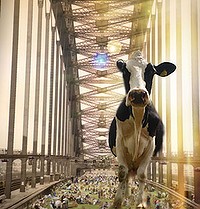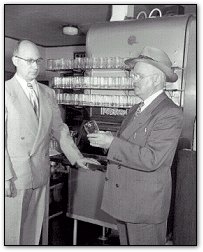 This Christmas will be my first away from snowy Canada and the family. Although I’ll miss the Filion family funtivities, I will not miss the cold. Rather I’m quite looking forward to seeing kangaroos for the first time, and attempting to surf in sunny Sydney.
This Christmas will be my first away from snowy Canada and the family. Although I’ll miss the Filion family funtivities, I will not miss the cold. Rather I’m quite looking forward to seeing kangaroos for the first time, and attempting to surf in sunny Sydney.
While I generously apply the SPF, New South Wales (NSW) eateries will be preparing for new food safety requirements in the coming year. The Sydney Morning Herald reports that 10% of NSW eateries failed to meet inspection standards in 2009, and as a result a mandatory food safety supervisor will be required starting next year.
The State Government will today release its first food safety report card, detailing the amount of inspections, fines and prosecutions handed down over the year.
Primary Industries Minister Steve Whan said,
”The report shows 10 per cent of food businesses did not comply with the standards and required ongoing intervention.”
The minister said the Government had amended the Food Act and a mandatory food handler training program would come into effect to ensure every food business had a designated food safety supervisor.
NSW lists inspection results online where premises are Name and Shamed.

 This Christmas I will be venturing to Australia for the first time. My flatmate graciously invited me to spend the holidays with her, and the chance to potentially bump into
This Christmas I will be venturing to Australia for the first time. My flatmate graciously invited me to spend the holidays with her, and the chance to potentially bump into  Evergreen Turf is the company responsible for trucking in the turf to cover the bridge roadway and its chief executive, Dean Holden, said it would take about eight semi-trailers to transport it and three hours to lay it.
Evergreen Turf is the company responsible for trucking in the turf to cover the bridge roadway and its chief executive, Dean Holden, said it would take about eight semi-trailers to transport it and three hours to lay it. The NSW has been targeting illicit meat processors and confiscated almost 120 kilograms of homemade nem chua – a Vietnamese-style fermented pork.
The NSW has been targeting illicit meat processors and confiscated almost 120 kilograms of homemade nem chua – a Vietnamese-style fermented pork. She has acquired spastic quadriplegia and a profound intellectual disability.
She has acquired spastic quadriplegia and a profound intellectual disability..jpg)
 The newspaper concludes that 40 per cent of all restaurants, takeaways and other food businesses in NSW were caught breaching one or more of the critical food handling practices when first visited by an inspector.
The newspaper concludes that 40 per cent of all restaurants, takeaways and other food businesses in NSW were caught breaching one or more of the critical food handling practices when first visited by an inspector..jpg) Journalist Mathew Moore does clearly state that whatever the limitations, “making this information public we can now expect improvements in standards that transparency and public scrutiny of government information can bring. The Food Authority deserves praise for releasing this information and giving the public far more data than it can get in any other state. It’s an important addition to the name and shame list … With its website and release of the statewide data, NSW has gone further than any other state.
Journalist Mathew Moore does clearly state that whatever the limitations, “making this information public we can now expect improvements in standards that transparency and public scrutiny of government information can bring. The Food Authority deserves praise for releasing this information and giving the public far more data than it can get in any other state. It’s an important addition to the name and shame list … With its website and release of the statewide data, NSW has gone further than any other state. The owner, Andrew Lum, says that reputation is in tatters after his eatery was fined by the Food Authority, then included on its name-and-shame list alongside rat- and cockroach-infested restaurants.
The owner, Andrew Lum, says that reputation is in tatters after his eatery was fined by the Food Authority, then included on its name-and-shame list alongside rat- and cockroach-infested restaurants..jpg) Health and safety inspectors have issued 160 fines in four weeks
Health and safety inspectors have issued 160 fines in four weeks Primary Industries Minister Ian Macdonald said Jemes Fish Market on Liverpool Road, Ashfield, in the city’s inner west, was hit with two fines of $660 for storing live crabs in a toilet cubicle.
Primary Industries Minister Ian Macdonald said Jemes Fish Market on Liverpool Road, Ashfield, in the city’s inner west, was hit with two fines of $660 for storing live crabs in a toilet cubicle..jpg) NSW Primary Industries Minister Ian Macdonald said the potential health issues were compounded by the fact the company ignored directives to lift its game.
NSW Primary Industries Minister Ian Macdonald said the potential health issues were compounded by the fact the company ignored directives to lift its game.